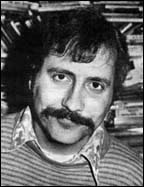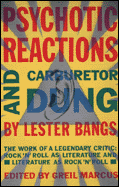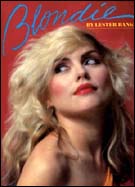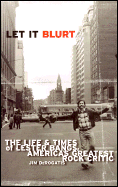 Lester
Bangs achieved - in death if not in life - something no other rock critic ever has:
stardom. In a way, I find this fitting, for Lester emulated in his writing the wild kinetic
energy of the rock 'n' roll he loved so much. He also imitated the wanton lifestyle of
the rock stars he wrote about with such ambivalence, and he died a drug-related death -
a certain road to celebrity - at age 33.
Lester
Bangs achieved - in death if not in life - something no other rock critic ever has:
stardom. In a way, I find this fitting, for Lester emulated in his writing the wild kinetic
energy of the rock 'n' roll he loved so much. He also imitated the wanton lifestyle of
the rock stars he wrote about with such ambivalence, and he died a drug-related death -
a certain road to celebrity - at age 33.
In another sense, Bangs' status as a legend is a bit of a joke (one he certainly
would appreciate). Though he wrote prodigiously - compulsively, even - he published only
one book during his lifetime. He could be maddeningly inconsistent and, by all accounts,
was a royal pain in the ass. Or, as Lester himself put it, "The only people who are
more unnecessary than rock musicians, who are totally interchangeable, are rock critics,
because who gives a fuck, right?"
But, if you want to know what makes good rock 'n' roll (or what makes rock 'n' roll good),
I can't think of a more important author than Lester Bangs. His style is exciting, his opinions
unassailable, and, despite intermittent appearances, he cared deeply about the music. More
than anyone before or since, Lester Bangs had a tremendous impact on pop culture simply by
writing about it.
Bang's friend and colleague, Greil Marcus, maintains that
a critic's primary obligation is to tell the truth. According to Marcus, "Lester didn't
lie. Lester was willing to make a complete fool of himself in search of the truth." In
the process, Marcus observed,
Bangs exposed his readers to, "the most extreme outbursts of humor, of pathos, of imagination,
of invention, of storytelling, of obscenity, of absurdity." Over twenty years hence,
Lester Bangs' writing continues to make most rock criticism look pale, timid, and dishonest
in comparison. (Read more about Lester Bangs in the All
Music Guide.)
 Psychotic
Reactions and Carburetor Dung
Psychotic
Reactions and Carburetor Dung
by Lester
Bangs (1988)
This book, a collection of his writings edited by Greil Marcus, is the definitive
Lester Bangs - posthumously, at least. Despite the fact that it skips his most famous work (for Rolling
Stone) due to contractual
limitations (i.e. Jann Wenner is an asshole), this anthology gives us a pretty clear window into the
riotous, conflicted soul of rock and roll's own Hunter S. Thompson. Words poured - no, spewed - from
the pen of Lester Bangs, and there will never be another like him. One was enough. Psychotic Reactions is
truly essential reading, if only for the strange, riveting, confrontational conversations between Bangs
and his fallen idol, Lou Reed. [top of page]
 Blondie
Blondie
by Lester
Bangs (1980)
The only actual book Bangs published during his lifetime (though he contributed to others), Lester Bangs' Blondie was
soon remaindered and now sells for upwards to $100 in collectors circles. In typical fashion, Bangs spends
as much time tearing his idols down as he does building them up. Blondie should have broken
the mold for rock bios; sadly and predictably, it didn't. [top of page]
 Let
It Blurt: The Life and Times of Lester Bangs
Let
It Blurt: The Life and Times of Lester Bangs
by Jim
DeRogatis (2000)
If Psychotic Reactions earned Lester Bangs a place of honor among his peers, Let It Blurt -
and its attendant media huzzahs - very nearly placed Bangs in the pantheon of public opinion. Certainly,
it cemented his status as a role model among earnest young college boys and gonzo journalist wannabes,
and it greased the skids for Bangs' appearance ( played by Philip Seymour Hoffman) in Cameron Crowe's
movie, Almost Famous. DeRogatis does a great job, though, and his book is a perfect companion
for Psychotic Reactions. Regardless, Let It Blurt would be worth any price for its
inclusion of Bangs' hilarious, scabrous, otherwise unavailable essay "How To Be A Rock Critic." [top of page]